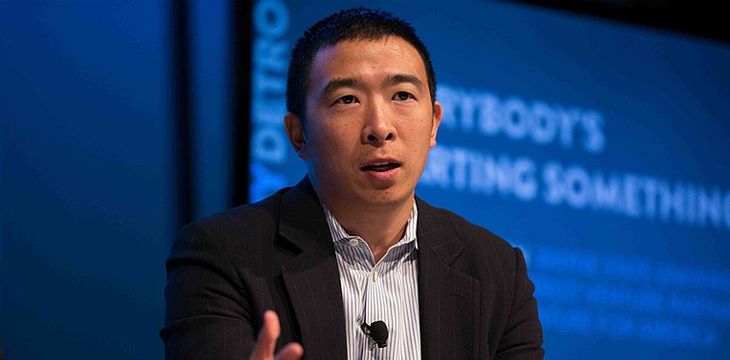|
Getting your Trinity Audio player ready...
|
Advocates for a serious, measured approach to cryptocurrency regulation lost a champion on Tuesday night. Andrew Yang has declared he will suspend his campaign for the Democratic Presidential nomination, raising legitimate questions about what comes next for the crypto space, politically speaking.
Yang declared his campaign was coming to an end as the final votes were being counted in the New Hampshire primary, where he received 2.8% of the vote, good for eight place. Bernie Sanders won the primary with 25.7% of the vote, trailed closely by Pete Buttigieg.
Andrew Yang speaks in NH: "While there is great work left to be done, you know, I am the math guy, and it is clear tonight from the numbers that we are not going to win this race. … Tonight, I am announcing that I am suspending my campaign for president" https://t.co/C8bXmJMzWI pic.twitter.com/bXUPgLzcJB
— CNN (@CNN) February 12, 2020
This followed his poor performance last week in the Iowa Caucuses, where he received only 1% of the State Delegate Equivalents. After that result, his campaign staff suffered layoffs, and he told supporters he would need to finish at least in fourth place in New Hampshire to get the funding required to continue on any longer.
This removes the candidate with the most vocal views on cryptocurrencies from the race. Shortly before the Iowa Caucuses, Yang gave an interview emphasizing the need for consistent regulation of the industry. He also dismissed fears that over regulation could squash innovation.
He’s also the only candidate that seriously approached cryptocurrency in his campaign platform. Several points covered the topic, including creating a Department of Technology, better defining terminology, and clarifying a wide range of issues from tax laws to department responsibilities.
The void he leaves now is huge. If you prefer the Democratic side of the ballot, front-runner Bernie Sanders has yet to declare any position on digital assets, but detractors have argued that his potential presidency would be great for crypto markets.
Now that most of the centrist candidates look weak in comparison to Bernie Sanders, many are hoping Michael Bloomberg could sweep in and win the nomination. That’s not much better for cryptocurrency advocates, as Bloomberg has been fairly dismissive of the space in the past.
Finally, if you’re happy with sticking to Trump, more regulation is coming. His 2021 budget gives the Secret Service new powers to police digital assets, specifically allowing them to disrupt terrorist financing. If they perceive existing exchanges might be complicit with such activity, they could be in for investigative headaches, at the minimum.
But that’s only if Trump can get congress to pass the budget into law. That may not happen without hard negotiations, and so this year’s presidential election could still change the regulatory situation after all.

 02-23-2026
02-23-2026 




